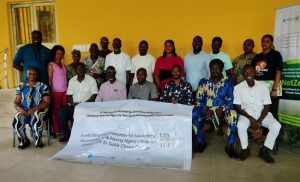In the bid to develop achievable net zero action plans for local governments and localise the country’s net zero commitment, Connected Advocacy, a non-governmental organisation, recently hosted capacity building workshops for stakeholders in Edo, Kaduna and Rivers states.

In Egor Local Government Area (LGA) of Edo State, the event emphasised the nature of climate change, its social, economic, and public health impacts, and highlighted the background causes and risks posed by the phenomenon. It also addressed the pressing questions of how to localise the achievement of carbon neutrality, the effects of emissions on communities, and strategies for local government offices to scale up their actions.
The training, which is part of the “Raising Awareness About Net-zero in Nigeria Project” being implemented by Connected Advocacy, International Climate Change Development Initiative (ICCDI) and Centre for 21st Century Issues, outlined comprehensive strategies for local government action to combat climate change to include: Identifying Key Emission Points, Minimising Emissions Across Sectors, Collaborating with Key Stakeholders, Implementing Jointly Agreed Strategies and Evaluating Progress.
In a call to action, Connected Advocacy urged all officials present to act decisively, emphasising the importance of developing robust policies, fostering collaborations, and taking concrete actions because, as they reiterated, climate change is real, and its impacts are already being felt.
At Sabon Gari LGA in Kaduna State, the Executive Director, Connected Advocacy, Prince Israel Orekha, gave a presentation on climate change and why it is a threatening issue for Sabon Gari.
Orekha, who said that the goal of the workshop is to localise the country’s net zero commitment by devising achievable decarbonisation plans that are implementable locally, elaborated on Nigeria’s net-zero pledge, explaining climate action plans and policies.
He underlined energy poverty as a pressing challenge in the northern part of the country, adding that people at the grassroots must deploy renewable energy to not only penetrate rural communities without access to the national grid, but to also contribute to global carbon mitigation effort.
Participants at the workshop identified key challenges such as plastic bag use, firewood burning, and the need for regulation and enforcement. They also explored innovative ideas and best practices for emission reduction.
The engagement session marked the beginning of a collaborative process to develop an LGA-specific climate action plan, which will outline mitigation and adaptation strategies, as well as community engagement and capacity building initiatives.
“By developing and implementing climate action plans, LGAs can play a significant role in reducing emissions, building resilience, and creating a more sustainable future for all Nigerians,” submitted Orekha.
At Ahoada East LGA, Rivers State, Ms. Evelyn Williams, the facilitator, explained the principles of effective climate action planning, integrating mitigation and adaptation strategies. She discussed the steps to develop an action plan, using emissions inventory, emission reduction goals, implementation strategies, and monitoring and reporting.
She emphasised the critical role of environmental impact assessment in identifying potential environmental impacts and developing strategies to mitigate them.
According to Connected Advocacy, the training enhanced the understanding of council staff on climate change, emissions reduction, and Nigeria’s net-zero commitment, even as participants gained insights into developing tailored climate action plans and aligning policies with national and international climate commitments.
The training recommended that:
- Ahoada East LGA should establish a climate change desk to coordinate climate-related activities and develop a climate action plan.
- The LGA should demand environmental impact assessment reports from investors and companies operating in the area.
- CAYED should provide technical support to the LGA in developing its climate action plan.
Prince Orekha in his closing remarks implored participants to embrace the opportunity and develop a plan or pathway for the LGA towards emission reduction, aligning with Nigeria’s net-zero commitment.
